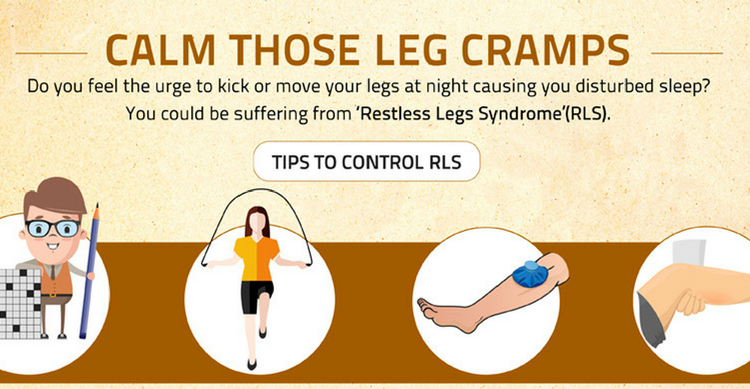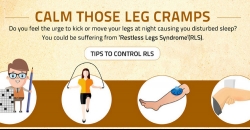
Do you feel a strange sensation in your leg or the urge to kick or flail your legs at night, resulting in you either waking up or your sleep getting disturbed?
If yes, then you might be suffering from a neurological disorder called ‘Restless Legs Syndrome’ or RLS.
The causes of RLS can be divided into the following categories:
- Idiopathic (Without any specific cause)
- Familial (May run in some families)
- “Iron deficiency anemia,” in which there is too little iron in the blood
- Other medical conditions like kidney disease, diabetes, and multiple sclerosis.
- Pregnancy
What are the symptoms of RLS? — People who have RLS get an uncomfortable urge to move their legs when they are at rest. They describe the feeling as crawling, creeping, pulling, or itching. And they say the feeling is deep in the legs – not on the skin – usually below the knees. These symptoms usually get worse as the day moves on, and they are worst at night. The only way that the sensation goes away is when people kick or move their legs. Some people with RLS find that their legs move on their own while they are asleep.
In short, the symptoms of RLS include:
- Occurring when the person is at rest
- Dissipating when the person moves their legs
- Getting worse at night
- Can sometimes include the legs moving on their own during sleep
Together, the symptoms of RLS can make it hard to get a good night’s sleep. People with the condition often feel tired during the day.
Is there a test for RLS? — There is a test, but it is not usually necessary. Your doctor should be able to diagnose it by asking about your symptoms and doing an exam. Still, it is possible that your doctor will decide to send you for blood tests to decide the cause of RLS like hemoglobin, sugar, urea etc. He may also order a “sleep study,” to confirm a diagnosis.
For a sleep study, you spend the night in a lab, and you are hooked up to different machines that monitor your movements, heart rate, breathing, and other body functions.
Is there anything I can do on my own to feel better? — Yes. You might feel better if you:
- Do activities that keep your mind alert during the day, such as crossword puzzles
- Get moderate regular exercise
- Massage your legs (or have someone massage them)
- Apply heat to your legs with heating pads or by taking a warm bath
- Avoid taking medicines that can make RLS worse – These include antihistamines and some antidepressants
Should I see a doctor? — See your doctor if your condition bothers you, or if it keeps you from getting a good night’s sleep.
How is RLS treated? — Some people with RLS do not need medication for it because their symptoms are mild and do not affect their daily lives. If treatment is needed, there are following medicines that a doctor can suggest. Examples include:
- Iron supplements
- Dopamine receptor agonists
- Seizure treatment medications
In people with RLS who also have a severe form of kidney disease called kidney failure, the RLS might improve with a treatment called hemodialysis (also known as just dialysis).
What if I am pregnant? — If you are pregnant, you can take iron supplements and try the other tips that do not involve taking prescription medicines. Most of the medicines used to treat RLS are not safe to take during pregnancy. If your symptoms are bad, there are some medicines that might be OK to take. But keep in mind that the condition usually goes away toward the end of pregnancy.
Dr. Vishal Pawar
Specialist Neurologist
Aster Speciality Clinic, International City (Pavillion Mall, France cluster)

